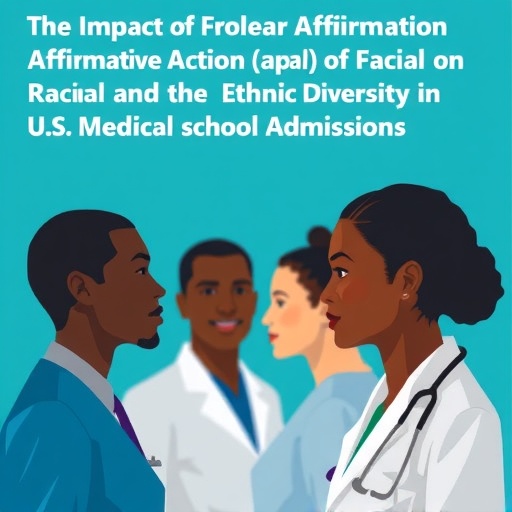The elimination of race-conscious admissions policies in medical schools has triggered a tangible decline in diversity among enrolled students, a trend that poses serious challenges to the ongoing efforts toward achieving health care equity. Recent findings from a comprehensive study published in JAMA Network Open illuminate the direct correlation between the removal of affirmative admissions strategies and the diminished representation of underrepresented minorities in medical education. This development threatens to undermine decades of progress that sought to create a more inclusive and culturally competent healthcare workforce.
Medical school diversity is not merely a matter of social justice or representation; it is fundamentally tied to improving health outcomes across diverse patient populations. Numerous studies have demonstrated that a diverse medical workforce enhances patient satisfaction, adherence to medical advice, and health outcomes, particularly in marginalized communities. The decline in diversity documented by this study signals a potential widening of existing healthcare disparities, as fewer physicians from underrepresented backgrounds may limit the cultural and linguistic competencies available within the healthcare system.
The research underscores the critical role that race-conscious admissions policies played in maintaining and increasing diversity. These policies aimed to mitigate the structural inequities entrenched in educational and socioeconomic systems that disproportionately affect minority applicants. The cessation of such policies, whether due to legal, political, or institutional reforms, has inadvertently contributed to a less diverse student body, emphasizing the persistent influence of systemic barriers in higher education admissions.
In response to these setbacks, the study advocates for alternative admissions strategies that embrace holistic review processes. Holistic admissions consider a broad range of applicant experiences, attributes, and academic metrics, providing a more comprehensive evaluation that recognizes the impact of structural barriers on candidate potential. These processes can incorporate socioeconomic background, overcoming adversity, leadership abilities, and commitment to serving underserved populations, thus fostering a more diverse and resilient medical workforce.
The findings also illuminate the dangers of a narrow admissions focus on standardized test scores and traditional academic indicators. Such criteria, while objective in appearance, often fail to capture the full breadth of applicant capabilities and disproportionately disadvantage students from marginalized and resource-limited backgrounds. The study recommends that medical schools critically reassess their admissions frameworks to identify and mitigate elements that hinder diversity without compromising academic excellence.
This research comes at a critical juncture when the United States is grappling with persistent health disparities exacerbated by social determinants such as race, ethnicity, and socioeconomic status. The erosion of diversity within medical education threatens to stall or reverse improvements in culturally competent care, which is crucial for addressing these disparities. An inclusive medical education environment builds physicians who are better equipped to serve diverse communities, understand unique patient experiences, and promote equitable health outcomes.
Furthermore, the study highlights that diversity in medical education encompasses more than racial and ethnic representation. It includes socio-economic diversity, geographic background, and life experiences, all of which enhance the educational milieu and expand the perspectives of future healthcare providers. Such diversity enriches classroom discussions, clinical training, and research, ultimately benefiting patient care on a systemic level.
The implications of reduced diversity extend beyond educational institutions and into the broader healthcare ecosystem. With fewer physicians from underrepresented groups entering the workforce, patients may face decreased access to culturally sensitive care providers. This scenario threatens to exacerbate mistrust between patients and healthcare providers and deepen systemic inequities that underpin health disparities.
Medical schools and policymakers must consider innovative strategies to sustain and enhance diversity in the absence of explicit race-conscious admissions. These might include partnerships with pipeline programs, targeted scholarships, mentorship opportunities, and community engagement initiatives that specifically support underrepresented groups throughout the educational continuum. The study suggests that a multipronged approach is necessary to address the complex and interrelated factors that influence diversity outcomes.
The challenges outlined by the study call for urgent action. Without intervention, the decline in medical school diversity is likely to curtail the progress made in health equity and weaken the capacity of the healthcare system to respond to the needs of a diverse population. Medical institutions, accreditation bodies, and governmental agencies must collaborate to develop policies and practices that foster inclusivity while recognizing the systemic inequities existing outside the academic environment.
Another crucial aspect underscored by the research is the need for transparency and accountability in admissions processes. Data collection and reporting on diversity metrics enable institutions to monitor trends, identify gaps, and evaluate the impact of interventions. This evidence-based approach is vital for creating a feedback loop that continually refines admissions practices in pursuit of greater equity and inclusion.
Finally, this study serves as a clarion call to the scientific, medical, and educational communities to reexamine their commitments to diversity and inclusion. The elimination of race-conscious admissions has made clear the fragility of gains in this area and the need for sustained, thoughtful strategies that consider the multifaceted nature of diversity. Only through deliberate, systemic efforts can the medical education system fulfill its role in constructing a healthcare workforce adept at meeting the challenges of an increasingly diverse society.
Subject of Research:
The impact of the elimination of race-conscious admissions policies on medical school diversity and its implications for health care equity.
Article Title:
Not explicitly provided in the content.
News Publication Date:
Not specified.
Web References:
DOI: 10.1001/jamanetworkopen.2025.35020 (link not provided).
References:
Not detailed in the content.
Image Credits:
Not available.
Keywords:
Education, Education policy, Racial differences, Ethnicity, Health care, Medical degrees, United States population.




